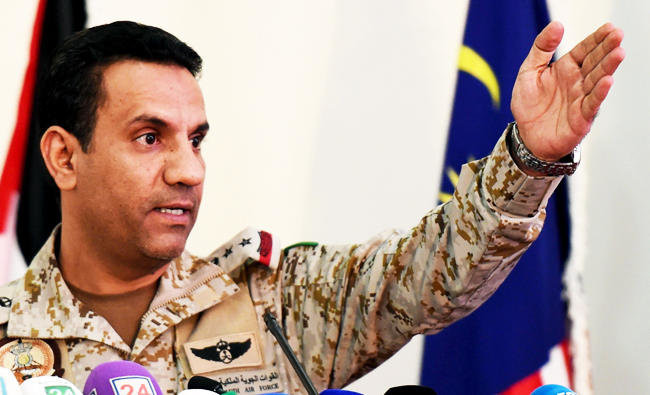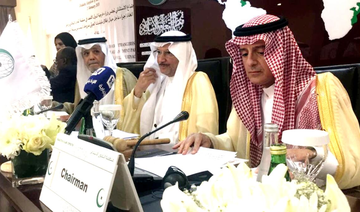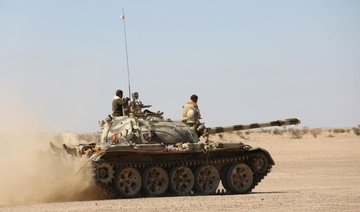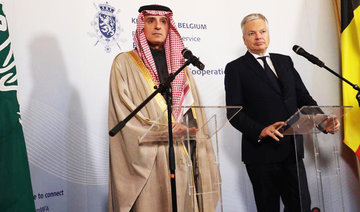RIYADH: The Saudi Ambassador to Yemen and the Spokesman of Arab Coalition Forces Supporting Legitimacy in Yemen outlined the humanitarian operation there at a meeting at the Saudi Ministry of Foreign Affairs on Tuesday.
Ambassador Mohammed bin Saeed Al-Jaber, who is also Director of Comprehensive Coordination of Humanitarian Affairs in Yemen, and Col. Turki Al-Malki met in the presence of a number of ambassadors and members of the diplomatic corps to explain the humanitarian needs of the Yemeni people and the delivery of shipments and oil derivatives to all Yemen regions, including Sana’a and Hodeidah.
Among the most important goals of the plan was consideration of the threat posed by Iranian-backed Houthi coup militias to the security of the Kingdom of Saudi Arabia, the countries of the region and the waterways of international trade. The Houthi militias had fired more than 250 ballistic missiles, more than 80 of them targeting the Kingdom.
They added that humanitarian contributions amounted to more than $900 million, including direct and indirect aid to Yemeni displaced people and joint programs with the Yemeni government worth more than $8 billion.
The comprehensive humanitarian plan for Yemen includes delivering four mobile cranes for the World Food Programme (WFP) and installing them in Hodeidah port. The plans aim to increase the capacity of the Yemeni ports and to make Yemen capable of receiving imports amounting to 1.4 million metric tons per month compared to 1.1 million metric tons per month in 2017.
It also aims to increase the capacity of the Yemeni ports in Aden, Mukalla and Mokha to 500,000 metric tons per month of oil derivatives as soon as possible, up from 250,000 metric tons per month in 2017.
They said that they plan to increase capacity in these ports by installing four mobile cranes, two in Mokha and one in Aden and Makala, in addition to other logistics’ projects in these ports, such as power generators and warehouses.
Jazan port will be used to receive goods because of its proximity to northern Yemen. The comprehensive humanitarian operation includes establishing an airlift in Marib to deliver key humanitarian aid and medical assistance by C-130 aircraft carriers through three border crossings from Saudi Arabia to Yemen, namely Al-Tuwal, to serve the Hajjah governorate of Yemen and Khadra to serve the governorates of Saada, Al-Jawf and Al- Wadi’ah.
The coalition will establish safe corridors to ensure delivery and distribution of aid and shipments to all Yemeni regions, to be used by United Nations agencies and other humanitarian organizations, they said, pointing out that the coalition will also allow the entry of fuel shipments, food shipments and humanitarian shipments to Hodeidah port for a month.
If the Houthi militias continue to refuse the plan, the port of Hodeidah will remain open exclusively for shipments of humanitarian aid, relief, medical supplies, and trade food shipments, they said.
These measures will also be applied to the port of Salib, as the fuel and non-food cargoes would be transferred to other cities, including Sana’a, Hodeidah and other areas, through safe corridors. The coalition will bear the cost of delivering to Houthi- controlled areas, maintaining the previous price level.
They said that Saudi Arabia will provide oil derivatives to Yemen to support the economy and alleviate the suffering of the Yemeni people. The coalition will provide the Central Bank of Yemen with a deposit to maintain control of the exchange rates and improve the living conditions of the Yemeni people.


Yemen humanitarian operation explained at Saudi meeting
Yemen humanitarian operation explained at Saudi meeting

Saudi foreign minister and Palestinian prime minister discuss Gaza in Davos

- Prince Faisal bin Farhan and Mohammed Mustafa hold talks while attending the World Economic Forum’s Annual Meeting
LONDON: Saudi Arabia’s foreign minister, Prince Faisal bin Farhan, and the Palestinian prime minister, Mohammed Mustafa, on Tuesday discussed the latest developments in Gaza.
During their meeting, which took place at the annual gathering of the World Economic Forum in Davos, Switzerland, they also reviewed bilateral relations and cooperation, the Saudi Press Agency reported.
Other Saudi officials present at the meeting included the Kingdom’s ambassador to Switzerland, Abdulrahman Al-Dawood; the director general of the Office of the Minister of Foreign Affairs, Waleed Al-Ismail; and Mohammed Alyahya, an advisor to the foreign minister.
© 2026 SAUDI RESEARCH & PUBLISHING COMPANY, All Rights Reserved And subject to Terms of Use Agreement.














